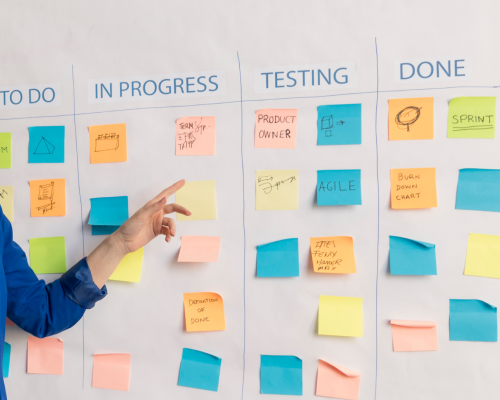
Embracing Agile Development Methodologies: Unleashing the Power of Scrum and Kanban

Introduction
In the dynamic world of web and mobile development, traditional linear project management approaches often struggle to keep pace with rapidly changing requirements and evolving client needs. Agile development methodologies have emerged as a powerful solution, enabling teams to adapt, collaborate, and deliver high-quality results efficiently. In this article, we will explore the benefits of agile development methodologies, with a focus on Scrum and Kanban. We will delve into their iterative and collaborative nature and discuss how they can drive success in web and mobile development projects.
Scrum: Empowering Iterative Excellence
Scrum is a widely adopted agile methodology known for its iterative and incremental approach. It breaks projects into small, manageable units called sprints, typically lasting 1-4 weeks. The iterative nature of Scrum allows for regular feedback and course correction, ensuring that the final product meets client expectations. The benefits of Scrum include improved visibility, increased adaptability, and enhanced collaboration among team members. The roles of Product Owner, Scrum Master, and Development Team work in tandem to prioritize tasks, remove impediments, and deliver value in each sprint.
Kanban: Visualizing Workflow Efficiency
Kanban is another popular agile methodology that emphasizes visualizing workflow and optimizing the flow of work. With Kanban, the focus is on minimizing bottlenecks, reducing waste, and maintaining a steady pace of delivery. Kanban boards, consisting of columns and cards representing work items, provide a visual representation of the project’s progress. Team members collaborate to move cards across columns, ensuring a smooth and continuous flow of work. Kanban’s flexibility and emphasis on continuous improvement make it ideal for projects with varying priorities and frequent changes.
Benefits of Agile Development Methodologies
a. Flexibility and Adaptability: Agile methodologies allow for flexibility and adaptability, enabling teams to respond quickly to changing requirements, client feedback, and market trends. This iterative approach promotes continuous learning and improvement throughout the project lifecycle.
b. Enhanced Collaboration: Agile methodologies foster collaboration among team members and stakeholders. Regular meetings, such as daily stand-ups and sprint reviews, facilitate open communication, knowledge sharing, and collective decision-making, leading to stronger teamwork and alignment.
c. Client Satisfaction: The iterative nature of agile methodologies ensures that client feedback is incorporated early and often. This results in higher client satisfaction as they witness tangible progress and have opportunities to influence the product’s direction.
d. Faster Time to Market: Agile methodologies promote incremental development and frequent releases, allowing businesses to deliver valuable features to the market faster. This provides a competitive advantage and enables early validation and feedback from users.
Conclusion
Agile development methodologies, such as Scrum and Kanban, have revolutionized the web and mobile development landscape. Their iterative and collaborative nature empowers teams to adapt to changing requirements, enhance collaboration, and deliver high-quality results efficiently. By embracing agile methodologies, businesses can achieve improved flexibility, enhanced client satisfaction, faster time to market, and ultimately, a competitive edge in the digital world. Whether it’s Scrum’s structured approach or Kanban’s focus on visualizing workflow, agile methodologies provide a solid foundation for success in web and mobile development projects. Embrace agility, unlock your team’s potential, and embark on a journey of iterative excellence.





